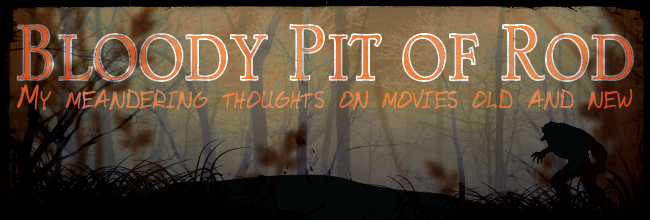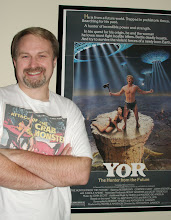Stationed in chilly Anchorage ,
Alaska , Captain Pat Hendry (Kenneth Tobey) and
his military aircrew are sent to a research station near the Arctic
Circle . Tagging along is newspaperman Ned "Scotty" Scott
(Douglas Spencer) who's looking for a story at the North Pole and hopes this
call from a scientific research team will be it. Hendry has been sent to the
station after a request for plane transport from the world renowned Professor
Arthur Carrington (Robert Cornwaithe). The scientists are excited because of a
magnetic disturbance and the sighting of a falling object that might be a
meteor. Once the group gets to the landing site of the object they quickly
realize that what they've found sunk into the ice is flying saucer! They
attempt to melt the thickening ice around the craft but accidentally destroy it
only to find the occupant frozen in ice several yards away. They chop the
eight-foot tall biped out of the ground and cart him back to the research
station where Hendry decides to keep their visitor on ice (literally) until
higher brass arrives. But when a storm delays the general's trip and an
electric blanket thaws out the E.T., circumstances change quickly. The visitor
from another world (James Arness) turns out to be an evolved piece of
vegetation that feeds on blood and intends to conquer Earth for its own kind!
Released at the beginning of the 1950s, The Thing's
box-office success was the spur that drove the sci-fi/horror film genre for
most of the decade. High-minded science fiction films like The Day the
Earth Stood Still were pushed aside for an onslaught of invading
creatures, slimy mutations and action. All of the various science-gone-mad and
giant bug films that marched across drive-in screens for the next 8 years could
be traced back to this one movie. All the classic conflicts of science vs. the
military, intellect vs. emotion and compassion vs. violence are perfectly
articulated in The Thing (even if the military is given an unfair
advantage). These conflicts would continue to inform science fiction films,
from the best (Them!) to the worst (your choice here), until the ideas were
reduced to nothing but clichés. Of course the '50s were fertile ground for the
kind of terror these stories thrust into the mass consciousness. The nuclear
age was newborn, with no one really knowing what might come of man's splitting
of the atom; reports of unidentified flying objects were making the news
regularly. The next obvious step was to posit a sinister explanation for the
UFOs and link it to the general public fear of invasion (if not by communists
then walking vegetables were close enough). Since The Thing is a
thriller, the rational scientific men who want to study and learn from the
alien are reduced to the role of decrying violence against such a monumental
discovery. Somehow I don't think a movie about a friendly alien vegetable
seeking peaceful coexistence would have fired the public's imagination as much,
but half a century later it's possible to see the scientists' point of view a
little clearer.
The Thing was adapted from John W. Campbell's
short story 'Who Goes There?' but really only the idea of an alien invader and
the arctic setting were used by Howard Hawks and his screen writers. The real
joy of the film is in watching another great Hawks ensemble cast enact a sharp
tale in the most entertaining fashion possible. It's a shame that Hawks' lack
of respect for the science fiction genre is evidenced by the fact that he
allowed Christian Nyby take director's credit for The Thing. It's now
known that this was done so that Nyby could get into the Director's Guild, but
it clearly shows that Hawks didn't take the film very seriously as part of his
career. Luckily for us he gave the film his usual 100% when on the job, as did
the entire cast. There isn't a weak performance in the film, with my favorite
being from genre stalwart Kenneth Tobey. Playing one of the few leading roles
of his career, Tobey is simply great — whether he's trying to romance the
lovely Margaret Sheridan or giving rapid-fire orders to his men while under
attack from the murderous carrot. If you dig this movie and want to see more of
the underrated Mr. Tobey I can recommend the Blu-Ray of It Came from
Beneath the Sea in which he has another good role up against a gigantic octopus
(courtesy of Ray Harryhausen's marvelous effects). The disc offers the film up
in a Harryhausen supervised colorized version as well as the original black
& white.












7 comments:
This is one of my favorite sci fi films ever. It gets better with each viewing, although I only watch it in the winter for obvious reasons. Also, what are your top five favorite and least favorite sci fi films of the '50's? Since you brought up the colorized film process, how do you feel about that? I never liked it. I've seen episodes of Gilligan's Island and various movies colorized, but they just didn't work for me, sloppy and unnatural. However, since Harryhausen supervised the process I'm curious. I'm asking you of your recommendations. Thanks.
This is one of the greatest science fiction films ever. As you said, it's just about perfectly done. Even if folks don't remember it specifically, it has so many elements that became prevalent in all the sf movies that followed. Highly recommended, and now shown on Turner Classic Movies with extra footage that was missing from my original VHS cut.
The colorization on the Harryhausen films is probably about as good as it can be done. Many places, it actually looks real. (And the films come with the glorious B&W, too. So, you can decide yourself.) Not a big fan of colorization -- in fact, I'd say I've hated most other instances -- but if it was good enough for Ray....
And THE THING FROM ANOTHER WORLD is the film most needing a full blu-ray restoration and upgrade.
(And what did they restore on TCM? The tied-up with Nikki scene?)
Yes, that and a few others. :)
I worked with Robert Cornthwaite on a show in about 1980 - he had done a translation of Pirandello's Six Characters In Search Of An Author, and our theater was doing it; Cornthwaite appeared in the production so I got to speak with him about his background and films. Because I had read Warren's Keep Watching The Skies (in which Warren made the same claim that Howard Hawks actually directed The Thing) I asked Bob point blank who directed the film. His answer: Christian Nyby, and Bob was unequivocal about it. Now, you could make the case that Hawks' stayle had been so thoroughly assimilated by Nyny that in effect Hawks DID direct it, but that's a different story. This is from the horse's mouth: Christian Nyby directed The Thing.
Hmm...I seem to be listed as "Unknown" here - can't figure out why. Sorry about the misspellings in the post about Robert Cornthwaite, LOL.
I'll try to post again and use a different browser to see if I can manage to become less "unknown".
Nope; didn't work. Well, sorry about that.
Tyrannocaster
The trouble with Hawks is that he casts such a long shadow -- and THE THING is so much in his style -- that people are bound to attribute the work to him, rather than to the actual director, Christian Nyby. Remember, not so long ago, when people were saying that Spielberg actually directed Poltergeist? Same thing. Fortunately, Tobe Hooper did enough other work that I don't think people are saying that anymore. But I don't think Nyby has had that chance.
This is a great film, an Nyby deserves the credit for it.
Post a Comment